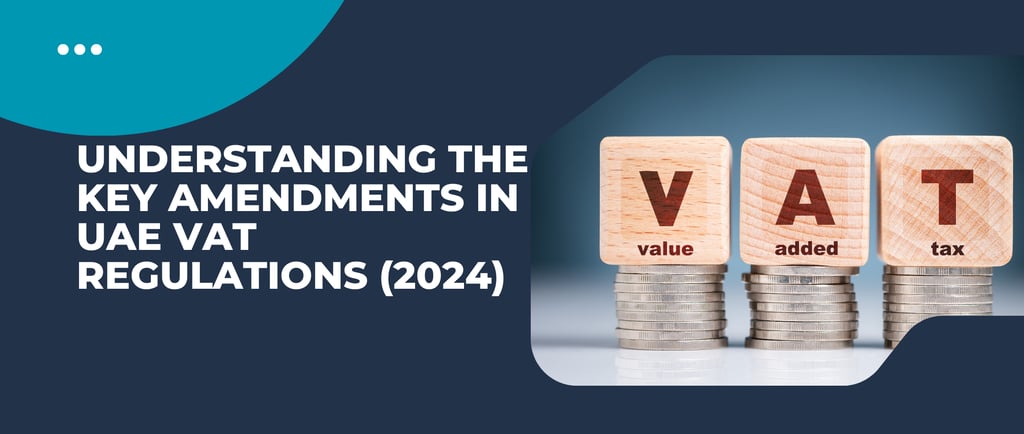Understanding the Key Amendments in UAE VAT Regulations (2024)
Discover the key amendments to UAE VAT regulations in 2024, including changes in registration, zero-rating provisions, and compliance requirements
3/27/20253 min read


Understanding the Key Amendments in UAE VAT Regulations (2024)
The UAE has introduced significant amendments to its VAT regulations through Cabinet Decision No. 100 of 2024, effective from November 15, 2024. To clarify these changes, the Federal Tax Authority (FTA) released a Public Clarification on March 14, 2025. These updates impact various aspects of VAT, including registration procedures, zero-rating provisions, input tax recovery, and invoicing requirements. Businesses must familiarize themselves with these changes to ensure compliance and avoid penalties.
Key Amendments and Their Implications
1. Revised Definitions for Enhanced Clarity
To ensure uniformity and alignment with evolving business environments, several new definitions have been introduced under Article 1 of the Executive Regulations:
Business Day: Now clearly aligned with the UAE Tax Procedures Law.
Standard Rate: Reinforces the standard 5% VAT rate as per Article 3 of the VAT Decree Law.
Virtual Assets: Cryptocurrencies such as Bitcoin and Ethereum are now recognized under VAT regulations, while digital representations of fiat currency remain excluded.
2. VAT Registration and De-registration Enhancements
Mandatory and Voluntary Registration: Businesses registering voluntarily must provide proof of active business operations in the UAE.
De-registration Compliance: The FTA has been empowered to de-register businesses failing to complete the required process.
Ensuring Tax Compliance: The FTA can revoke VAT registration if an entity no longer meets eligibility criteria, even without a formal de-registration request.
Tax Group Regulations: Companies within a tax group must notify the authority if a member ceases taxable activities.
3. Amendments to VAT on Supplies and Zero-Rating
Taxable Supplies: Transfer of ownership in real estate is now explicitly classified as a taxable supply.
Composite Supplies: Transactions consisting of multiple components sold as a single unit without separate pricing may qualify as a single supply for VAT purposes.
Deemed Supplies: The threshold for deemed supplies, including commercial gifts and samples, is now AED 2000 within a 12-month period. The previous condition of AED 500 per recipient has been removed.
4. Revised Zero-Rating Provisions
Export of Goods: Documentation requirements have been simplified, allowing a combination of customs declarations, shipping certificates, and clearance documents to substantiate exports.
Export of Services: The updated regulations expand the zero-rated service categories but clarify exclusions related to real estate, transportation, and in-country consumption.
International Transport Services: Local transportation services are zero-rated only if they are directly linked to international transport provided by the same service provider.
Healthcare & Financial Services: Zero-rating continues for healthcare services, while additional clarifications have been provided on financial services, including Islamic finance transactions.
5. Input Tax Recovery and Exemptions
Exempt Supplies: A more precise mechanism has been introduced for claiming input VAT related to exempt supplies.
Apportionment of Input Tax: Enhanced rules now dictate the allocation of input VAT between taxable and exempt supplies.
Capital Assets Scheme: Clarifications have been made regarding adjustments for capital assets. The first year of VAT application for internally developed capital assets is now defined as the year they are first used, even if they were ready in the previous year.
6. VAT Invoicing and Record-Keeping Requirements
Invoice Formatting: The updated regulations specify mandatory details and formatting requirements for tax invoices.
Record Retention: Businesses must retain VAT-related records for extended durations to ensure compliance with regulatory updates.
7. Special Provisions for Government and Foreign Entities
Government Transactions: Certain real estate and project transfers between government entities are explicitly excluded from VAT.
Foreign Diplomatic Entities: New conditions have been outlined for VAT refunds applicable to foreign diplomatic missions and international organizations.
Ensuring Compliance in a Changing VAT Landscape
With these amendments, businesses operating in the UAE must stay vigilant and adapt their tax processes accordingly. Seeking professional guidance from a certified tax consultancy can streamline compliance and reduce the risk of penalties.
For expert assistance in navigating these VAT changes, businesses can consult with Alwahat Accounts and Internal Audit Services to ensure that their financial operations remain aligned with the latest regulatory requirements.
Address
Faisal 2 Bldg, Office No 203, King Faisal St, Al Nad- Al Qasimia, Sharjah, UAE
Level 17, World Trade Center, Khalifa Bin Zayed, the first street- Abudhabi
Unit 32 -
4th Floor, AWR Properties - Al Fahidi Heights Office Tower, beside Central Mall ,near Sharaf DG metro station exit 4,Dubai ,U.A.E
Contacts
info@alwahataudit.com
+971589373943
We empower you to make well-informed decisions and successfully attain your financial objectives.


All copyrights reserved @Al-Wahat Accounts & Internal Audits | Designed - Abhijith.digital
Subscribe to our newsletter


